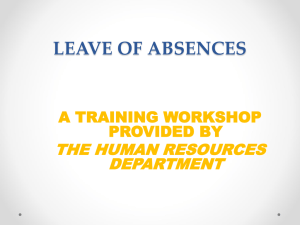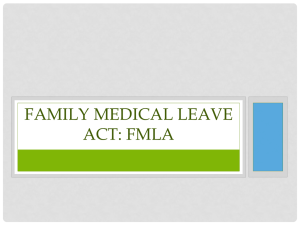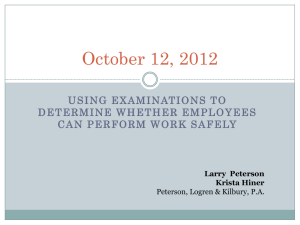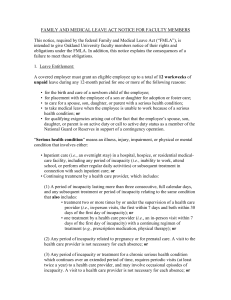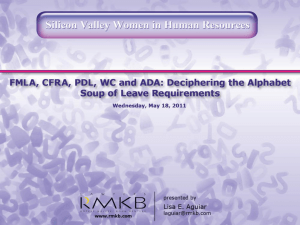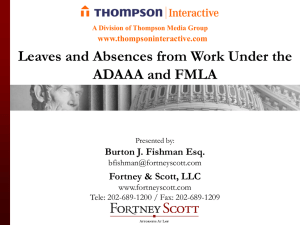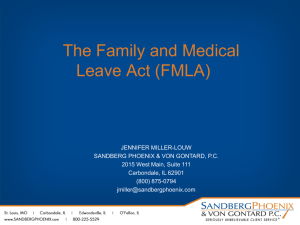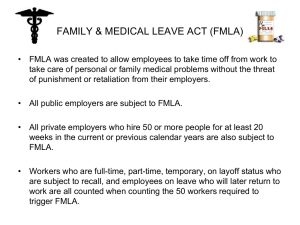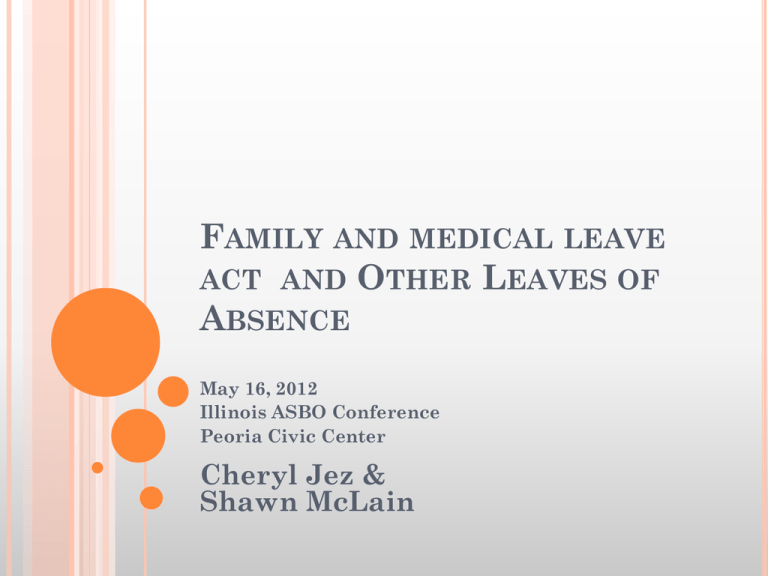
FAMILY AND MEDICAL LEAVE
ACT AND OTHER LEAVES OF
ABSENCE
May 16, 2012
Illinois ASBO Conference
Peoria Civic Center
Cheryl Jez &
Shawn McLain
TYPES OF LEAVE
Family and Medical Leave Act (FMLA)
American with Disabilities Act (ADA)
Uniformed Services Employment and Reemployment
Rights Act (USERRA)
Illinois Family Military Leave Act
Illinois Victims’ Economic Security and Safety Act
(VESSA)
Illinois School Code Leave (Sick Leave)
Illinois School Visitation Rights Act
Contractual Leave
Workers’ Compensation
BASIC FMLA RIGHTS
Up to 12 workweeks of leave during a 12-month
period because of:
Birth of employee’s child, care for newborn
Placement of child with employee due to
adoption/foster care
Care for employee’s child, parent, spouse with serious
health condition
Employee’s own serious health condition
**New provisions related to leave to care for covered
service members
Right to reinstatement to same or equivalent
position, subject to exceptions
Right to group health plan benefits continuation
ELIGIBILITY
• 12 months; may not be consecutive (exclusion: 7 year
gap)
AND
1250 hours in the preceding 12 months (24 hrs/wk)
• 50+ employees/75 mile radius – surface miles by
available transportation from worksite (usually waived/does
not apply to Public Sector)
•“No fixed worksite” (i.e. sales): headcount of site they report to
• Determined at time of request; may re-request count during a
leave
4
HEALTH BENEFITS
Employers must maintain employee group health
coverage
Employees must pay their portion of premium. If
unpaid, benefits could cease with appropriate
employee notification
Employers can recover unpaid premiums
Employer is not obligated to maintain any other
benefits unless benefits are continued for other leave
types
5
JOB PROTECTION
Entitles employee to resume pre-leave or equivalent
position with equivalent pay and benefits
Layoffs OR a Reduction in Force
No FMLA protection
If employment would end as an active employee, the
employee can be terminated while on leave
No entitlement to accrue seniority while on leave
(promotions and benefits)
6
“INSTRUCTIONAL EMPLOYEES”
DEFINED
7
Instructional employee/Teacher — Instructional employees
are those whose principal function is to teach and instruct
students in a class, a small group, or an individual setting. This
term includes not only teachers, but also athletic coaches,
driving instructors, and special education assistants, such as
signers for the hearing impaired.
It does not include teacher assistants or aides who do not have
as their principal job actual teaching or instructing, nor does it
include auxiliary personnel such as counselors, psychologists, or
curriculum specialists.
It also does not include cafeteria workers, maintenance
workers, or bus drivers
SPECIAL RULES FOR
“INSTRUCTIONAL EMPLOYEES”
The 50 employee rule does
The FMLA has special
not apply
rules for instructional
Eligibility requirements
employees to enable them
for employees apply with
to take family or medical
the exception that full-
leave without disrupting
time teachers are deemed
the classroom at a critical
to have met the 1,250
point in the school term
hours of employment
8
LEAVE FOR INTERMITTENT OR
REDUCED SCHEDULE
Planned medical treatment – < 20% absent work days
Take leave for a period of a duration not great than the duration of the
planned medical treatment
Temporarily transfer to an available alternative position with equivalent pay
and benefits
Leave begins > 5 weeks before end of a term
Employer may require the employee to continue taking leave until the end of
the term if the leave will last for at least 3 weeks and the employee would
return during the final 3 weeks of the term
Any longer leave required cannot be counted against 12 weeks
Example: Third grade teacher Mary begins FMLA leave to care for her seriously ill
child on Oct. 1 and plans to return to work on Nov. 15. The school term ends on
Dec. 1. Mary’s employer may require her to continue taking leave until the end of
the term because her return would occur within three weeks of the end of the school
semester
9
TRACKING METHODS
12 month period
Calendar year
Any 12 month period applied consistently
Forward (looks back to a fixed date, the start date of the first
leave)
Rolling backward (12 month look back for each day taken)
26 month period for Military Caregiver Leave:
10
Forward from first day of Caregiver leave, regardless of FMLA
time already taken in the past
ABSENCE TYPES
Continuous
Intermittent
11
Four or more consecutive calendars days off of work
Could be Friday, Saturday, Sunday and Monday)
Reduced number of days in a workweek
Reduced number of hours in a day
INTERMITTENT SPECIFICS
Must meet a serious health condition definition
Can be a single injury/illness day
doctor appointment, prenatal exam
physical therapy, chemotherapy
morning sickness
Must be measured in same increment of time as other leaves
no longer than 1 hour
Can be intermittent for care of newborn if agreed upon by employer
Must be calculated according to employees scheduled time
12
Required OT missed can be FMLA
FAMILY MEMBER DEFINITION
Spouse
Husband or wife as defined by state law including common law
marriages. Federal FMLA does not include same sex domestic
partners
Parent
Biological parent or individual who stands or stood in loco
parentis to employee. Federal FMLA does not include parents-inlaw or grandparents
Child
Biological, adopted, foster, stepchild, legal ward, or child of
person standing in loco parentis. Must be under 18 unless
incapable of self-care due to disability (documentation or merely a
statement of loco parentis acceptable)
•
Next of Kin
for service member leave
the nearest blood relative of the individual
13
MILITARY LEAVE OVERVIEW
Two Types
Qualifying Exigency
Military Caregiver
Same Eligibility for Employers
Special Eligibility for Employees
14
New definitions of “children”
New category, “next of kin.”
MILITARY FAMILY LEAVES
Qualifying Exigency – up to 12 weeks
Covered employees may take up to 12 weeks of leave per
year to deal with certain issues relating to a family
member’s active duty or call to active duty including
deployment to a foreign country – starts on the first day of
leave
Military Caregiver - up to 26 weeks
15
Covered employees may take up to 26 weeks in a single
year to care for a family member who is/was seriously ill or
injured in active military duty (within 5 years of the
military service) – starts on the first day of leave
MILITARY PROVISIONS
(QUALIFYING EXIGENCY)
16
FMLA allows families of National Guard and Reserve on
active duty to take FMLA to manage their affairs, for
"qualifying exigency" leave
The new rule defines "qualifying exigencies" as:
(1) short-notice deployment; (less than 7 days)
(2) military events and related activities;
(3) childcare and school activities;
(4) financial and legal arrangements;
(5) counseling;
(6) rest and recuperation; (5 days)
(7) post-deployment activities; (up to 90 days, includes death)
(8) additional activities the employer and employee agree to
MILITARY CAREGIVER
FMLA protections for family members caring for a covered
service member with a serious injury or illness incurred in the
line of duty on active duty. The family member can be a “Next
of Kin”
Leave is up to 26 workweeks of leave in a
single 12-month period measured forward
from the first day of leave
17
QUALIFYING EVENT
FMLA Serious Health Condition
definition is broad and is intended to
cover many physical and medical
conditions
• Employees Own Serious Health Condition
• Care for employees (well) child after birth, or
placement for adoption / foster care
• Care for employees spouse, child, parent, (next of kin if
service member) who has a serious health condition
• Deployment Activities for Military
18
SIX SERIOUS HEALTH CONDITION
DEFINITIONS
Inpatient care plus incapacity and treatment
More than 3 consecutive calendars days of
incapacity plus treatment
Colds, flu, common headaches, and other
common ailments can qualify
19
Pregnancy-prenatal care
Chronic conditions
Permanent & long-term conditions
Multiple treatments
REQUIRED VISITS TO A HEALTH
CARE PROVIDER
20
If leave involves more than three consecutive calendar days of
incapacity plus two visits to a health care provider
two visits must occur within 30 days of incapacity
first visit in person within 7 days of first date of incapacity
If the leave is for a chronic
serious health condition, there
must be at least two visits/year
to the health care provider
EMPLOYER NOTICE - 5 BUSINESS DAYS
(NOT 2)
WHEN:
employees request FMLA leave
when employers acquire knowledge that an employee’s leave may be
for an FMLA-qualifying reason
ACTION:
21
employers must notify employees of their eligibility to take FMLA
leave within five business days, absent extenuating circumstances
1
2
4
5
3
ELIGIBILITY NOTICE
Eligibility notice must include:
•
“Rights and Responsibilities” that detail expectations/obligations
and explain any consequences of the employee’s failure to comply
–
•
•
22
Notice of rights and responsibilities may be distributed electronically
if it meets the requirements in the law
Requirements to provide medical certification, the right to
substitute paid leave, whether to and how to pay premiums for
benefits, and job restoration rights upon expiration of FMLA
leave
May include the FMLA medical
certification form
DESIGNATION NOTICE
Notifies the employee of exactly how much time is applied to
FMLA
23
If not possible for employer to determine how much time will be
used,
employer must provide the information every 30 days upon
employee’s
request if leave is taken within the 30-day period
Must inform employees of Fit for Duty requirements and
essential
functions of job if doctor certification requires Job Description
review
Rights and Responsibilities notice
is to be included if not already
sent with eligibility notice
EMPLOYEE REQUIREMENTS
Employees must comply with usual and customary
notice and procedural requirements for requesting
leave (absent unusual circumstances)
Requirements may include providing written notice of
the reasons and anticipated start and duration of the
leave or requirement that employees contact a specific
individual to request leave
Examples of “unusual circumstances” include:
a) no one answered telephone number the employee
called
b) company voice mail box is full
c) employees are unable to use telephone because
they are seeking emergency treatment
24
EMPLOYEE REQUIREMENTS
Employee to explain:
reasons for leave to allow a determination as to whether the
leave qualifies
calling in sick is not considered sufficient notice to trigger an
employer’s FMLA obligations
If employee fails to explain the reasons, leave may be denied
Employee to give information:
25
Note, if self reported for 2 days and not at work on 3rd, employer
should consider this may qualify and provide FMLA notice
must specifically reference the qualifying reason for leave or
the need for FMLA leave
CERTIFICATION OF SERIOUS HEALTH
CONDITION
Certification from health care provider must be submitted by the
employee within 15 days of the request
Certification must state that the employee
is unable to perform job functions
is needed to care for a child, spouse, parent or next of kin (service
member leave) and the estimated amount of time needed to care
for the family member
26
INCOMPLETE CERTIFICATIONS
New rule’s for incomplete/insufficient
certifications:
Notify employees in writing of the additional information
that is needed within 5 business days
Allow 7 calendar days to provide the additional
information
If employees fails to submit a complete/sufficient
certification,
the FMLA leave may be denied
No obligation to notify employee that the
document has not been received
27
AMERICANS WITH DISABILITIES
ACT
Covered
28
Employers:
15 or more employees
Within 20 or more calendar weeks in current
or preceding year
WHAT IS A DISABILITY?
Physical
History
or mental impairment, or
of impairment, or
Perceived
as having an impairment…
… Which substantially limits one or more
major life activities.
29
MAJOR LIFE ACTIVITIES
Caring for oneself
Performing manual tasks
Walking
Seeing
Breathing
Learning and/or working
30
“SUBSTANTIALLY
Unable
LIMITS”
to perform a major life activity, or
Significantly
restricts the condition,
manner, or duration under which an
individual can perform a major life
activity as compared to average person.
31
QUALIFIED INDIVIDUAL WITH A
DISABILITY
With
or without reasonable
accommodation, can perform
“essential functions” of the job.
32
REQUIREMENTS AND LEAVE
UNDER THE ADA
District
required to provide reasonable
accommodations to perform essential
functions of job unless undue hardship
Reasonable
accommodation may include
flexible leave time and modified work
schedules.
Leave
is reasonable accommodation only
if it may help an employee eventually
perform the essential function of the job.
33
2009 ADA AMENDMENTS
Went into effect January 1, 2009.
Undo a decade of employer-friendly ADA court
decisions.
Require courts to interpret the term “disability”
in a much broader fashion.
Require courts to disregard ameliorative effects
that mediation or other assistive devices may
have on an individual’s physical or mental
impairment for purposes of determining whether
or not they have a “disability.”
Broaden the definition of “major life activity”.
34
USERRA
USERRA is the acronym for the Uniformed Services
Employment and Reemployment Rights Act of 1994.
Establishes the cumulative length of time that an
individual may be absent from work for military duty
and retain certain employment rights.
5 years, with some exceptions:
initial enlistments lasting more than five years,
periodic National Guard and Reserve training duty, and
involuntary active duty extensions and recalls, especially
during a time of national emergency.
35
USERRA
USERRA provides that returning servicemembers are reemployed in the job that they
would have attained had they not been absent
from military service with
Same seniority
Same status
Same pay
All other rights and benefits determined by seniority.
36
Requires reasonable efforts be made to
refresh/upgrade returning service members’
skills to help them re-qualify for employment.
USERRA
Other requirements and issues:
Notice requirements
Health coverage
Pension continuation
Department of Labor, Veteran's Employment and
Training Services provides enforcement assistance to
persons having USERRA claims.
37
Growing area of litigation—just be aware of the
issue and the law.
ILLINOIS
FAMILY MILITARY LEAVE ACT
38
Family military leave is leave requested by an
employee who is the spouse, parent, child, or
grandparent of a person called to military service
lasting longer than 30 days with the State or US
pursuant to the orders of the Governor or
President.
Leave occurs during the time federal or state
deployment orders are in effect
ILLINOIS
FAMILY MILITARY LEAVE ACT
Employers 15-50 Employees:
Employees receive up to 15 days of unpaid family
military leave.
Employers 50+ Employees:
Employees receive up to 30 days of unpaid family
military leave.
Number of days may be reduced by number of days
provided to the employee under Section 102(a)(1)(E)
of FMLA.
39
Leave may consist of unpaid leave.
ILLINOIS VICTIMS’ ECONOMIC
SECURITY AND SAFETY ACT (VESSA)
40
Employee who is a victim of domestic or sexual
violence, or who has a family or household
member that is the victim of domestic or sexual
violence whose interest are not adverse to those
of the employee, may take unpaid leave from
work to address the issue in a manner provided
for in 820 ILCS 180/20(a).
The employer may require the employee to certify
that the victim has been the subject of domestic
or sexual violence and that the leave is being
taken to address the violence.
ILLINOIS VICTIMS’ ECONOMIC
SECURITY AND SAFETY ACT (VESSA)
15-49 Employees:
50+ Employees:
41
8 weeks during any 12-month period.
12 weeks during any 12-month period.
Intermittent or on reduced leave schedule.
Confidentiality provisions requiring the strictest
of confidence.
Unpaid leave
ILLINOIS VICTIMS’ ECONOMIC
SECURITY AND SAFETY ACT (VESSA)
Employee who takes leave entitled to:
Same or equivalent position as when leave started
No loss of benefits accrued prior to taking leave
Maintained group health coverage
Employee not entitled to:
Accrual of seniority or employee benefits
Position employee would have been entitled to if they
had not taken the leave
42
IL Department of Labor enforces violations.
ILLINOIS SCHOOL CODE LEAVE
Several Types in School Code:
43
Sick Leave
Jury Duty Leave
Sabbatical Leave
Association President Leave
Retirement Trustee Leave
Teaching Overseas
Sick Leave is most common type of leave used
from the school code.
Teacher may not be discharged for using sick
leave when it is used for an appropriate purpose.
ILLINOIS SCHOOL CODE LEAVE:
SICK LEAVE
44
School districts must give their full-time teachers
no fewer than 10 sick leave days per school year.
(105 ILCS 5/24-6).
All 10 days become available on the first day of
school (unless different in CBA).
Unused sick leave may be accumulated to at least
180 days.
Leave may be used for personal illness, home
quarantine, or serious illness or death in the
immediate family or household.
ILLINOIS SCHOOL CODE LEAVE:
SICK LEAVE
Employee may also use sick leave to stay at home with sick
spouse or child without losing pay.
School Board may require employee to submit a physician’s
certificate to support a claim for sick leave pay for personal
illness more than 3 days or 30 days for the birth or as a the
school board may deem necessary in other cases.
45
If the leave was fewer than 3 days, then the District must pay
the expense of obtaining the certificate.
For paid leave for adoption or placement for adoption, the
school board may require that the teacher or other
employee provide evidence that the formal adoption process
is underway, and such leave is limited to 30 days unless a
longer leave has been negotiated with the exclusive
bargaining representative.
ILLINOIS SCHOOL CODE LEAVE:
JURY DUTY LEAVE
46
An employee who is summoned for jury duty
must be given time off and may not be discharged
if the employee gives reasonable notice to the
employer.
A teacher does not lose salary as a result of jury
duty, although the board may deduct the amount
received for jury duty from the teacher’s pay. 105
ILCS 5/10-20.7.
ILLINOIS SCHOOL VISITATION
RIGHTS ACT
Employer must grant an employee leave up to 8
hours during any school year; no more than 4
hours may be taken on any given day
Employee must be employed at least 6 months
and employed at least part‐time
47
Part-time is specific to employer’s polices and
procedures or collective bargaining agreement
ILLINOIS SCHOOL VISITATION
RIGHTS ACT
Cannot be taken unless all accrued time‐off, with
the exception of sick and disability leaves, has
been exhausted.
Leave is generally unpaid or employee can
request to utilize a make-up shift if there is a
reasonable opportunity to do so.
48
This includes accrued vacation and personal leave.
If it would require overtime, it is not reasonable.
Employee benefits will continue during the leave
ILLINOIS SCHOOL VISITATION
RIGHTS ACT
49
Upon completion of school visitation rights, the school
administrator shall provide documentation of the
school visitation.
The employee will be required to submit such
verification to the manager within two working days
of the school visitation.
Failure to complete any of the necessary notification
may result in disciplinary procedures.
Employer penalty for violation of act is a fine of not
more than $100.00.
CONTRACTUAL LEAVE
Bereavement
Personal
Leave
Extended
50
Leave
Leave w/o Pay
ILLINOIS
WORKERS’ COMPENSATION
Compensating injured employees. 820 ILCS
305/1 et. seq.
May run simultaneously with FMLA and counted
against FMLA
Paid leave cannot overlap
Work Comp pay v. sick leave
WC is paid leave and employer can’t require
employee to take other forms of paid leave at same
time (unpaid FMLA leave may run at the same time)
51

